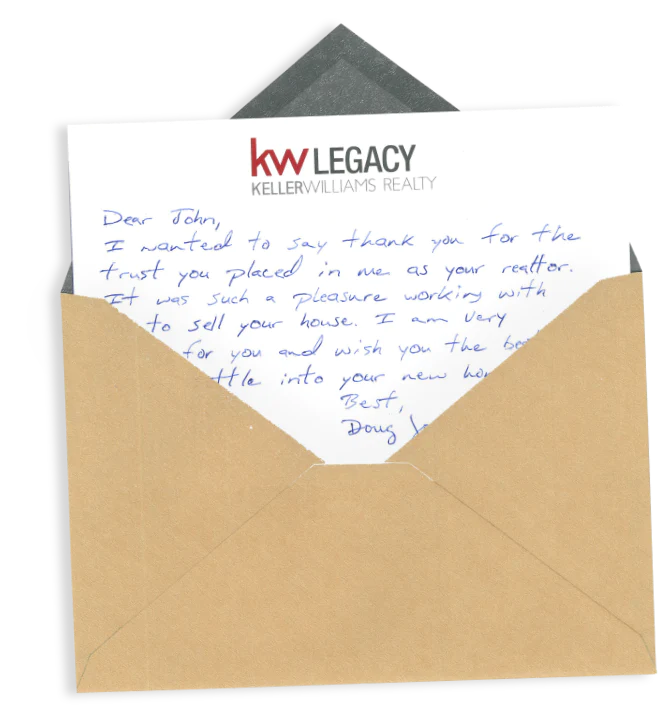Real Estate Farming Made Easy | Simply Noted

Farm Area Real Estate: How Agents Can Build a Solid Local Business
We're all familiar with the classic images of agricultural farming — tractors running through vast fields of wheat, cotton, and vegetables, raising up tiny seeds into fruitful plants that pay the farmer's efforts back with their bounty. What you might not realize is that real estate farming follows a similar path, which is why they share a name.
When you farm area real estate you aren't planting 2x4s and growing them into saleable houses, of course. Instead, you're sowing the seeds of local expertise and growing them into future business. Real estate farming is the process of developing a deep understanding of a particular geographic area — often but not always the neighborhood where you live and work — and then becoming known as the go-to expert on that area. The process takes time, but with consistent application, real estate farming in your local real estate market can build long-term relationships that will blossom into sales in the future.
Real estate agents looking to build a brisk, stable business use real estate marketing farming techniques to introduce themselves to a specific geographic region or even their preferred neighborhood or neighborhoods and then develop those contacts into trust-based relationships that lay the groundwork for future representation. This article will focus on how to real estate farm effectively, regardless of your local conditions. But first, a bit more on what real estate farming is.

What is Real Estate Farming?
If you're a new real estate agent, you likely have plenty of enthusiasm and high hopes for your business. What you don't have, however, are clients, and without those, your dreams will quickly fizzle. Real estate farming attempts to grow your business by laying the seeds of your expertise within a specific area so that you're the agent on people's minds when they go to sell. This is slow burn real estate marketing. It takes time to build, but the payoff can be great.
To extend the analogy, the "fields" where you'll plant your seeds are specific neighborhoods, those where you want to focus your business. The "seeds" are discrete marketing efforts designed to show people in the local market that you're an expert in selling in their area. You sow these seeds and then "water" them with continued awareness campaigns that develop your image and keep you at the front of your prospects' minds.
Successful real estate farms create an acute awareness of your qualifications and establish deep roots in the local market such that when people look to list their homes, you're the first name they think of. These relationships are the grist as well as the final result of your farming efforts. Many agents have had great success with this tactic.
How to Create a Real Estate Farming Plan
Just like an agricultural farmer, a real estate farmer has to have a plan for their business. You can't just buy a couple acres of land, throw some seeds down, and hope for the best. You have to have a strategy for what type of crops you're going to plant, when you're going to plant them, and how you're going to care for them. The same is true of real estate farming. You need to know what your goals are, who your target market is, and what type of marketing campaigns you're going to use to reach them.

Define Your Target Audience
Agents, particularly new ones, often assume they have to cultivate business throughout a wide area to capture enough clients to survive. This is almost always the wrong strategy. The problem is it can cost a lot of money to market across an entire city or other large geographical regions, and starting out your marketing budgets are frequently small.
Geographic farming narrows large markets into more targeted campaigns, allowing you to spend marketing dollars more efficiently. Instead of an entire region, you can focus your efforts on a specific neighborhood or a small chunk of your local county. The goal is to focus on the houses you want to sell, and those you have the best chance of selling successfully.
Start by defining your preferred demographics. Do you want to sell high-end real estate or do you want to focus on buyers and sellers of more modest means? Are you looking to focus in your own neighborhood or somewhere else? If you know more about a specific area it will be easier to establish your expertise in that market.
Defining your target might involve going to community events, talking to neighborhood residents, combing through sold listings, and driving around. Your target area may be simply a single geographic area, but you might also drill down further, to focus only on houses above a certain price range in a given location. Defining your target market helps you focus only on the places and types of properties you want to sell.
Compile Market Statistics
Your goal with real estate farming is to establish yourself as a knowledgeable, trustworthy local expert, so make sure you know your stuff. Study your chosen market and learn everything you can about it. Look at what other agents are doing. Examine current listings and local market conditions. How long do houses stay on the market? What's the average price per square foot? Are prices rising or falling?
You should also be familiar with any recent development projects, zoning changes, construction that might be coming to the farm area, and anything else that would impact your prospects' decision to buy or sell a home. This type of research will help you identify potential leads, as well as position you as a valuable resource to them.

Collect Data on Past Sales
In addition to general market data, you should also be familiar with recent sales in your target area. This is the best way to establish your credibility as an expert. When meeting with potential clients, be able to answer their questions about comparable sales in the farm area.
You can find this data by doing Google searches for your real estate market and searching your local MLS or public records. If you have a good relationship with another agent in the farm area, they may also be willing to share information on past sales.
Set Some Goals
With your target market and statistics in hand, it's time to set some goals for your farming efforts. How many homes do you want to sell in the next year? What's your budget for marketing and advertising? Are you going to focus on sellers or buyers?
Your goals will help you determine what type of marketing campaigns to use, as well as how much money to spend. They will also give you something to measure your success against.
Select Your Tactics
Once you know where you're focusing and what you're trying to accomplish, you need to put thought into the types of tactics you'll use to reach your target audience. Some options include:
- Real estate farming postcards
- Handwritten direct mail pieces
- Door hangers
- Door knocking
- Targeted Facebook ads
- Sponsorships with neighborhood events
- Networking events
- Facebook group conversations
- Open houses
- Partnerships with local businesses
The tactics you choose should connect with the people you're trying to reach. You wouldn't set up a table outside local grocery stores if your targets shop online, and you don't want to knock on doors if the community has proscriptions against it. Be sensitive to the best ways to reach the people you're trying to communicate with.

The Best Real Estate Farming Ideas (And How to Use Them)
There are a number of different ways to go about real estate farming, but one of the most effective is direct mail, both handwritten and standard versions. Direct mail enjoys higher open rates than other marketing tactics, with handwritten cards and letters scoring a whopping 99%. Open and engagement rates are important to consider because it doesn't matter what messages you're putting out in the marketplace if no one ever sees them.
Handwritten Direct Mail's Advantages
Handwritten cards and letters are a great way to make a personal connection with potential clients, which is essential for building trust. Trust is essential in the real estate business, so anything you can do to create this valuable currency will benefit your business.
Handwritten communications feel more personal than other marketing tactics. They give the reader the sense that you're writing to them specifically, instead of blanketing an area with marketing. It creates a one-on-one connection that's hard to replicate with other tactics. Your real estate farm area doesn't need to know you're contacting everyone, and they won't if they feel you've written to them specifically.
Using Handwritten Direct Mail
The best way to put consistent effort into a particular real estate farm area is to automate your handwriting efforts, and that requires Simply Noted. Using the same marketing automation software you might use for an email campaign, you can trigger automated handwritten cards and letters using Simply Noted. We've built the most advanced fleet of handwriting robots available.
Our machines use real ballpoint pens and advanced smart fonts to create absolutely convincing handwritten results without you ever having to pick up a pen. You can create complex marketing automation workflows with full personalization, and have warm handwritten cards sent on a regular schedule. Best of all, it's affordable!

Door-to-Door Marketing
Another great way to reach potential clients is door-to-door marketing. This involves going directly to homes in your target area and leaving information about your services. This real estate farming idea is perfect for the real estate agent that loves to meet people face to face. The trick is to get people when they're home and willing to talk with you. If you're a naturally charismatic person that's likely not an issue. Door-to-door tactics are a great way to get your name and face in front of potential clients, and it can be very effective if done properly.
How to Market Door to Door Effectively
When you're marketing door to door, it's important to be respectful and sensitive to the homeowner. You should always have information about who you are, what company you work for, and why you're there. Be sure to dress professionally, even if that means wearing a polo shirt with your company logo instead of a suit.
The best time to catch people at home is in the evening after they've gotten home from work. Weekends are also generally good times to find people at home. However, you should avoid weekends if there are likely to be a lot of events going on in the neighborhood, as this will make it harder to get people's attention.
It's important to be aware of homeowners' body language. If they don't want to talk, don't force the issue. Simply leave your information and move on. The last thing you want is to come across as pushy or sales-y.
Door-to-door marketing can be a great way to get in front of potential clients, but it's important to do it the right way. Be respectful, professional, and sensitive to people's cues, and you'll be sure to make a good impression.

Sponsoring Local Events
Another great way to reach potential clients is by sponsoring local events. This could be anything from a little league team to a 5k race. Sponsoring an event shows that you're invested in the community, and it's a great way to get your name out there. It's also a great opportunity to meet potential clients face to face.
How to Sponsor a Local Event
When you're sponsoring a local event, it's important to choose an event that's relevant to your business. For example, if you're a real estate agent, sponsoring a little league team may not make sense. However, sponsoring a homebuyer's seminar would be a great way to get in front of potential clients.
It's also important to choose an event that's a good fit for your budget. There's no sense in spending more money than you can afford, or more than the event is worth.
Once you've chosen an event to sponsor, be sure to promote it! This is your chance to show potential clients that you're invested in the community, so make the most of it. You can promote your sponsorship on social media, in your local paper, or even on billboards.
If you're thinking of starting a career in real estate, or if you're already working in the industry and looking for new ways to build your business, real estate farming may be just what you need. It's a time-tested strategy that can lead to a steady stream of clients and a successful career in real estate.























